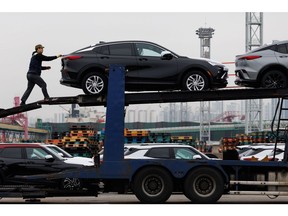
Article content
(Bloomberg) — Car buyers will bear the brunt of the $30 billion cost of President Donald Trump’s tariffs, driving up already high US auto prices by almost $2,000 per vehicle, according to consultant AlixPartners.
THIS CONTENT IS RESERVED FOR SUBSCRIBERS ONLY
Subscribe now to read the latest news in your city and across Canada.
- Exclusive articles from Barbara Shecter, Joe O'Connor, Gabriel Friedman, and others.
- Daily content from Financial Times, the world's leading global business publication.
- Unlimited online access to read articles from Financial Post, National Post and 15 news sites across Canada with one account.
- National Post ePaper, an electronic replica of the print edition to view on any device, share and comment on.
- Daily puzzles, including the New York Times Crossword.
SUBSCRIBE TO UNLOCK MORE ARTICLES
Subscribe now to read the latest news in your city and across Canada.
- Exclusive articles from Barbara Shecter, Joe O'Connor, Gabriel Friedman and others.
- Daily content from Financial Times, the world's leading global business publication.
- Unlimited online access to read articles from Financial Post, National Post and 15 news sites across Canada with one account.
- National Post ePaper, an electronic replica of the print edition to view on any device, share and comment on.
- Daily puzzles, including the New York Times Crossword.
REGISTER / SIGN IN TO UNLOCK MORE ARTICLES
Create an account or sign in to continue with your reading experience.
- Access articles from across Canada with one account.
- Share your thoughts and join the conversation in the comments.
- Enjoy additional articles per month.
- Get email updates from your favourite authors.
THIS ARTICLE IS FREE TO READ REGISTER TO UNLOCK.
Create an account or sign in to continue with your reading experience.
- Access articles from across Canada with one account
- Share your thoughts and join the conversation in the comments
- Enjoy additional articles per month
- Get email updates from your favourite authors
Sign In or Create an Account
or
Article content
The firm expects auto companies to pass along 80% of the cost of Trump’s tariffs — which it calculates as $1,760 more per car. AlixPartners, as part of its annual global automotive outlook, also cautioned that the administration’s anti-electric vehicle policies risk relegating American automakers to bit players in the global EV market.
Article content
Article content
Article content
“These tariffs bring a big wall of cost,” Mark Wakefield, global auto market lead for AlixPartners, told reporters in an online briefing. We see “consumers taking the majority of the hit.”
Article content
By signing up you consent to receive the above newsletter from Postmedia Network Inc.
Article content
General Motors Co. and Ford Motor Co. have already said they expect a $5 billion and $2.5 billion tariff impact this year, respectively, though they say they will find offsets in part through price adjustments.
Article content
Those higher prices will result in about 1 million fewer vehicles sold in the US over the next three years, Wakefield said. But the consultant expects US auto sales to reach 17 million in 2030, 1 million more than last year, as the impact of tariffs abates.
Article content
AlixPartners’ predicted sales hit is more muted than some other projections because the firm sees tariff rates falling as the US negotiates trade deals with other countries. It forecasts the 25% auto tariff will ultimately fall to 7.5% on assembled autos, 5% on parts and even lower on cars and parts that are compliant with the US-Mexico-Canada trade agreement.
Article content
“This tariff wall is not likely to last forever,” Wakefield said.
Article content
Article content
What’s likely to have a longer-lasting impact is the Trump administration’s move to reduce and eliminate incentives to spur the sale of electric vehicles, such as the $7,500 consumer tax credit for purchasing a battery powered model, he said.
Article content
That will steer car buyers away from EVs as they “follow their pocketbook” and buy traditional gasoline-fueled vehicles, Wakefield said.
Article content
AlixPartners slashed its forecast for EV sales in the US by nearly half. It now sees battery electric vehicles making up just 17% of US auto sales in 2030, down from a previous prediction that EVs would make up 31% of sales by then.
Article content
Traditional internal combustion engine vehicles will account for half of US sales in 2030, up from AlixPartners’ previous prediction that they would only make up about one-third of sales.
Article content
The consultant sees traditional hybrids accounting for 27% of the US market in 2030, up from its prior forecast of 24%, while plug-in hybrids and extended-range electric vehicles will account for just 6% of US auto sales by then, down from a previous prediction of 10%.
Article content
That will hurt US automakers’ competitiveness and perhaps even leave them dependent on global EV leader China, Wakefield said.
Article content
“It makes it much more likely that they end up licensing or joint venturing or otherwise using platforms and EV technologies from China,” he said in an interview.
Article content
The “aggressive take-down of support” for EVs, will leave American automakers with the dubious distinction of being the world leader in big, gas-guzzling engines, a century-old technology that’s in decline, Wakefield said.
Article content
“They’ll have the world’s best V8 engines by 2028,” Wakefield said of American automakers. “They’ll probably also have the world’s only V8 engines by 2028.”
Article content

.jpg) 5 hours ago
1
5 hours ago
1
 English (US)
English (US)